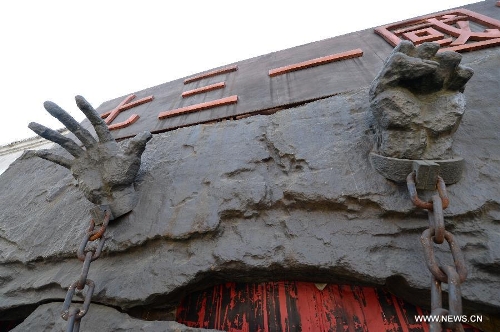Chinese blogger called 'Unit 731 steamed and dried Chinese to measure human water content' as 'rumor,' enraging Chinese netizens

Photo taken on April 18, 2014 shows a sculpture at the Unit 731 ruins and sites in Harbin, capital of Northeast China's Heilongjiang Province. File Photo: Xinhua
A Chinese blogger known for popularizing science enraged Chinese netizens after he claimed that dehydration experiments conducted by Japanese Unit 731 on Chinese people were just rumors. Some of the netizens posted scenes from documentary films and historical records to prove that such brutal experiments had indeed been carried out.
The controversy went viral on Chinese social media platforms on Wednesday, with the hashtag "What did Unit 731 do" earning more than 40 million views on Sina Weibo.
Unit 731 was a covert biological and chemical warfare research and development unit of the Imperial Japanese Army that undertook lethal human experimentation during the war.
The controversy started from a Sina Weibo post on Monday that said "Do you know that 70 percent of the human body being composed of water was a conclusion drawn by the experiments of Unit 731?" The post continued by describing the unit's experiments involving drying human subjects, bringing the violent acts of the Japanese unit during the War of Resistance against Japanese Aggression (1931-45) onto the public stage again.
Chinese cartoonist Wuheqilin then forwarded the post and commented that the crimes committed by the Japanese army should be always remembered and never forgiven.
The blogger, who possesses more than 4 million followers on Sina Weibo, also commented on the post on Monday, but he claimed that the experiment that demonstrated how much water is in the human body did not originate with Unit 731 and that it is impossible to steam dry a body.
The part of the blogger's post that sparked huge controversy was "the unit has committed enough atrocities, it is not necessary to use lurid rumors to add to these atrocities."
Lots of netizens, including cartoonist Wuheqilin, were enraged by the blogger's comment and condemned him for calling the unit's brutal experiments rumors.
"The fact that drying the whole body is not realistic only shows that the experiment's conclusion is not accurate. Can you prove that the Japanese army did not do this experiment? Can you draw the conclusion in your last paragraph that someone used rumors to add new atrocities to the Japanese army?" Wuheqilin wrote on Tuesday.
The cartoonist and another Sina Weibo account "Sina Military" uploaded historical records such as documentary works by Japanese writers and Japan's secret Unit 731 - where biological warfare was conceived, a documentary film produced by Russian media RT, to prove that the unit did conduct the brutal experiment on prisoners.
The film features interviews with several Japanese veterans of Unit 731, who tell their own stories of the atrocities they participated in, according to the website guancha.cn.
The blogger's comment cannot be found on Sina Weibo and he has not made any response concerning the controversy.
